Organic tea is a fresh leaf produced in a place without any pollution, and there is no chemical in the process of packaging and packaging, and it has been certified by the organic food certification body. It is a truly natural, high-quality healthy drink, and it is also the trend of tea production development in the future. It has great potential for planting. Now the planting technology is introduced as follows.

Organic tea planting technology points
1. Environmental choice
Tea gardens should be far away from urban and industrial areas. The air is in line with the national first-class standard for atmospheric environment. The water quality of irrigation water should also meet the national standard for surface water environmental quality. The content of heavy metals such as copper, lead, cadmium, arsenic, mercury and chromium in soil. Must be lower than the national organic tea processing technology standards.
2, garden choice
The seed seedlings are from organic agricultural production. The seedlings obtained by genetic engineering cannot be used. The green belts are arranged around the tea garden. The organic tea and non-organic agricultural production land must be constructed with isolation belts. The tea garden soil is deep and fertile, with good permeability and organic matter content >1.5. %, pH 4.5 to 6.5, effective soil layer loose, strong biological activity. No toilets, pits, or animals can be built within 100 meters of the tea garden.
3. Soil management
For 1 to 3 years old tea gardens, green manure should be made between rows to improve soil. Before the rainy season, the soil can be covered with non-polluting straw and mountain green to reduce the loss of water, soil and fertilizer. For tea gardens with fertile soil and no weeds, no less tillage should be used. The use of earthworms to improve soil structure, improve fertility, and the use of chemical herbicides, synergists and soil amendments are strictly prohibited.

4, fertilization technology
Fertilization in organic tea gardens should follow the fertilization guidelines of organic tea, and carry out scientific and rational fertilization according to the nutritional characteristics of tea trees and the physical and chemical properties of tea garden soil. The main criteria are as follows:
(1) It is forbidden to apply chemically synthesized fertilizers, urban and rural garbage, industrial and mining wastewater, sludge, hospital waste and various organic and inorganic wastes contaminated by pesticides, chemicals, heavy metals, poisonous gases and pathogens.
(2) It is strictly forbidden to use uncooked fresh human excrement and livestock manure. If it is applied, it must be harmlessly treated to kill various parasite eggs, pathogens and weed seeds to meet the requirements of organic tea production. Relevant standards.
(3) In principle, the organic fertilizer is taken locally, applied locally, and applied locally. The external farm organic fertilizer has been tested and confirmed to meet the requirements before it can be used. Some commercial organic fertilizers, organic compound fertilizers, active bio-organic fertilizers, organic foliar fertilizers, microbial fertilizers, etc. must be clearly used by organic certification bodies for certification or approval.
(4) After applying natural mineral fertilizers, it is necessary to ascertain the main and auxiliary components and contents, storage and transportation of the origin, packaging, etc., and confirm that they are non-polluting and purely natural substances.
(5) Strongly advocate intercropping of various legume green manure, applying grass fertilizer and pruning leaves and leaves back to the garden.
(6) Regularly monitor the soil of the tea garden and establish a file for fertilization in the tea garden. If the fertilizer applied is found to cause excessive environmental quality or pollution, it must be immediately stopped and reported to the organic tea certification body.
Fertilizers that are prohibited from being applied:
Chemical nitrogen fertilizer: refers to chemically synthesized ammonium sulfate, urea, ammonium hydrogencarbonate, ammonium chloride, ammonium nitrate, ammonia, and the like.
Chemical phosphate fertilizer: refers to chemically processed superphosphate, calcium magnesium phosphate potassium fertilizer.
Chemical Potassium Fertilizer: refers to chemically processed potassium sulfate, magnesium chloride, ammonium nitrate, and the like.
Chemical compound fertilizer: refers to chemically synthesized ammonium phosphate, potassium dihydrogen phosphate, imported compound fertilizer, compound fertilizer and the like.
Foliar fertilizer: a multifunctional foliar nutrient solution containing chemical surface adhesion agents, penetrants and synthetic chemicals, and rare earth element fertilizers.
Municipal waste: Contains high levels of heavy metals and harmful substances, so it is not suitable for application.
Factory, urban wastewater: contains high levels of heavy metals and harmful substances, so it is not suitable for application.
Sludge: Contains high levels of heavy metals and harmful substances, so it is not suitable for application.

Fertilizers allowed to be applied:
Heap (沤) fertilizer: refers to the farmer's organic fertilizer through the action of microorganisms, after a few weeks of harmless treatment by high temperature organisms, the use of any prohibited substances is not allowed in the fertilizer.
Livestock and poultry manure: after rot and harmless treatment.
Sea fat: fully decomposed after heap rot.
Various cake fertilizers: tea seed cake, tung seed cake, etc. have to be piled up, other cake fertilizer can be applied.
Peat (charcoal): high or low, uncontaminated, heavy metal content not exceeding the standard.
Humic acid salt: such as lignite, weathered coal, natural minerals, etc., can be used after crushing through 100 mesh.
Animal debris or products: such as blood meal, fish meal, bone meal, hoof, horn powder, skin, hair powder, etc., silkworm cocoon (after heap rot), silkworm sand.
Green manure: spring sowing summer green manure, autumn sowing winter green manure, perennial green manure on the rim, and legume green manure is the best.
Grass fertilizer: mountain grass, water grass, garden grass, etc., to be applied after exposure, heaping and sputum treatment.
Natural minerals and mineral products: refers to phosphate rock powder, biotite powder, feldspar powder, dolomite powder, vermiculite powder, anhydrous magnesium potassium strontium, zeolite, bentonite and so on. The content of harmful heavy metal elements cannot exceed the standard.
Amino acid foliar fertilizer: refers to the amino acid product fertilizer produced by non-gene conversion bioengineering using animal and plant as raw materials and certified by organic. Such as: such as gold peptide amino acid foliar fertilizer.
For more exciting pictures and popular comments on organic tea, click below to view the original ↓ ↓ ↓
NINGBO MEDICAL EQUIPMENT CO.,LTD , https://www.techartmeds.com